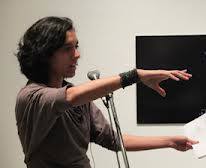We spoke to Sonnet L’Abbé, our poetry judge, about the two books of poetry she is working on, and her advice for Room’s contest applicants.
The deadline for submitting to Room’s annual writing contest is less than a month away. After speaking with our fiction, and creative non-fiction judge, we talked to Dr. Sonnet L’Abbé, who will be judging poetry submissions. The poet lets us in on the two books of poetry she is currently working on, and why poets submitting to Room’s writing contest should consider being “caring” in their writing.
Since receiving the RBC Bronwen Wallace Award for Emerging Writers in 2001, Dr. Sonnet L’Abbé, has published two books of poetry, A Strange Relief (2001), and Killarnoe (2007). L’Abbé also reviews fiction and poetry regularly for The Globe and Mail. During the summer of 2013, the poet and literary critic was also, the Artist-in-Motion for the 2017 Starts Now initiative hosted by CBC Radio-Canada, Community Foundations of Canada and Via Rail. You can watch the poet perform the “crowdsourced” poem here.
ROOM: Let’s start from the beginning–what compelled you to start writing poetry instead of other genres?
L’ABBÉ: I started reading poetry very early. At about age 7 I was drawn to find out what this thing called a sonnet was – it shared my name, when no other kids did! In Grade 11 computer science class I used to type out Shakespeare’s sonnets. And when I started writing more seriously, I found that poetry suited my temperament. I liked to finish things quickly and by aiming to finish a poem rather than a story I was able to get that sense of completion in a few days, rather than a few weeks. Now I’ll take more than a few weeks to get longer poetic works done, but I think a short attention span was a factor in the beginning.
ROOM: Is there any one thing you try to achieve by the end of each final draft?
L’ABBÉ: I only know it’s the end when it feels finished. But in the final stages of revision I’m always going for an economy of expression and precision of language.
ROOM: What was the last piece of poetry you read that had a significant effect on you?
L’ABBÉ: Hmm. I’d say Vanessa Place’s Statement of Facts (2010) was important intellectually, as it advanced a conversation that interested me about found and documentary poetry. A recent poem by Jim Nason, “Eclipse,” has lingered with me after I combed through a year’s worth of poems published in Canadian journals – reminding me of the power of image and lyricism when lately my own interests have leaned toward the conceptual and procedural. And Wislawa Szymborksa’s “Conversation With A Stone,” a poem which I have known for a long time, produced, when I recently shared it with a friend, a moment so vibrant with poetry’s power to bring-into-the-present that I still shiver when I recall it.
ROOM: In a previous interview (with UBC Reports), you said that you wanted to “invent ideas and ideals” and to “create Canadian culture”. How do you think poetry and Canadian culture have changed since you first started out more than ten years ago? Where do you hope things will go from here?
L’ABBÉ: Well, in that article I was talking about the thoughts that led me when I was younger and perhaps more idealistic. I think Canadian popular interest in “high” culture – art, books, classical music – has taken a beating from an anti-intellectualism that is not confined to Canadian culture. I think of the spirit and times that produced the Group of Seven, Margaret Atwood, and Glenn Gould and want to continue in that vein, while at the same time feel that said spirit was rather WASPy. I like that Canadians are being compelled to grapple with their colonial history; I cringe at the way the Harper crew is rewriting that history; I think these struggles for storytelling over the founding of the nation are productive, interesting, important.
ROOM: Are you working on any writing projects right now?
L’ABBÉ: Yes, I’m working on two books of poetry. One, that considers the biological and spiritual affinities between plants and humans is called Sentient Mental Flower Book. The other is a “writing-over” of Shakespeare’s sonnets called Sonnet’s Shakespeare.
ROOM: What advice do you have for the writers wishing to submit their poetry to the Room contest?
L’ABBÉ: Caring is the new black. Poems that keep the reader at an ironic distance often come off more glib, more insubstantial, and more forgettable than the writer means. This does not necessarily mean lyric is the only way to go. It has always been hard to pull off affecting a reader without being gushy or maudlin. But go for it.
ROOM: Final question: with the #readwomen2014 reading list in mind, who are a few of your favourite female authors, poets or otherwise?
L’ABBÉ: Gosh. I’ll name just a few, all faves for different reasons: Wislawa Szymborska, Jhumpa Lahiri, Lisa Robertson, Sharon Thesen, Cecily Nicholson, Carol Shields, Amy Hempel, Mary Gaitskill.














